March 9th, 2021 — 11:16pm
The Book of Lost Names by Kristin Harmel
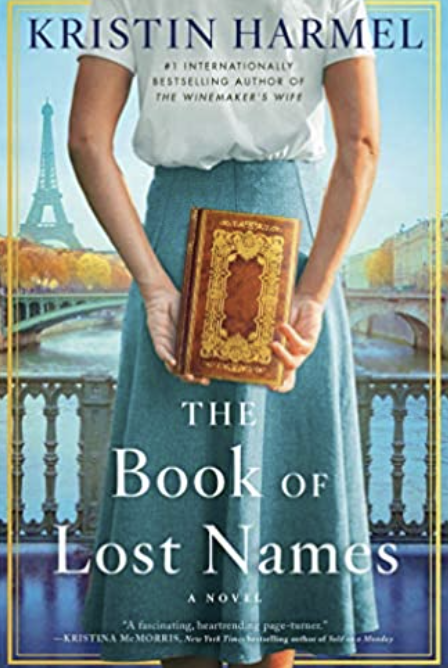 When I came across this outstanding book about the Holocaust, I was immediately reminded of all the excellent and meaningful books I have read about this subject. The first one probably being The Diary of Anne Frank and then so many other such interesting reads such as The Thief, The Nightingale, All the Light We Cannot See, Schindler’s List, as well as many others including many that I have not yet read.
When I came across this outstanding book about the Holocaust, I was immediately reminded of all the excellent and meaningful books I have read about this subject. The first one probably being The Diary of Anne Frank and then so many other such interesting reads such as The Thief, The Nightingale, All the Light We Cannot See, Schindler’s List, as well as many others including many that I have not yet read.
This story is about a woman who has skills, which make her an excellent forger, which allows her to save the lives of many children and adults as they escape from the Nazis. In doing so, she puts her own life at great risk. This triggers a familiar question, “Could I have put my own life at such a great risk if faced with a similar situation.” Most of us will never know, but as we experience the bravery of this woman, we are challenged to consider this question.
The story highlights the complexities of the parent-child relationship in this difficult situation. Factor in a love and romance and the conflicts of such feelings when the woman has these feelings towards a non-Jewish man that she never imagined could take place.
The great value of this book is not only that it is a well written adventure story with romance, intrigue, and danger, most important, it reminds us that Nazi Germany existed in the lifetime of some of us or in the lifespan of our parents and cannot be allowed to be forgotten.
Comment » | FH - Fiction Historical, FT- Fiction Thriller, HI - History
February 15th, 2018 — 12:18am
Underground in Berlin: A Young Woman’s Extraordinary Tale of Survival in the Heart of Nazi Germany by Marie Jalowicz Simon (translated by Anthea Bell with a foreword and afterword by Hermann Simon)
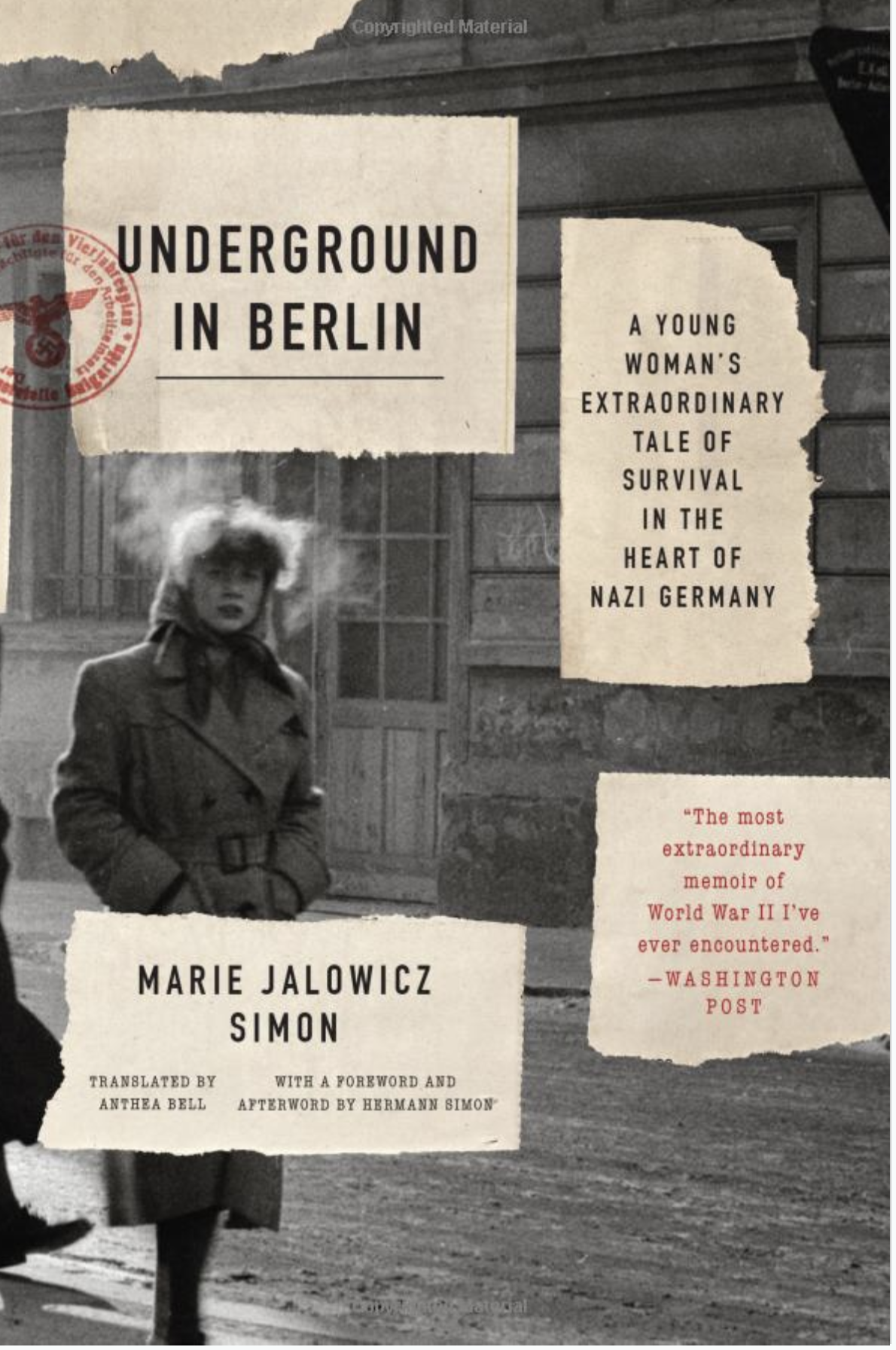
Hermann Simon knew his mother as a loving parent who was a Professor of Classical Antiquities at the Humboldt University of Berlin. He also knew that his mother survived World War II by staying and hiding most of the time in Berlin. During that period in Berlin, so she would not be discovered as a Jewish girl in her 20s and sent to a concentration camp. She rarely spoke about this experience and her son really didn’t know the details. Shortly before her death in 1998, he put a tape recorded in front of her and she agreed to tell her story.
Not only did Ms. Simon tell the story chronologically in vivid detail, but she also revealed her inner thoughts and feelings. She related how at first she wore the yellow Jewish star as was expected to be worn by all Jews in the city, although periodically she would hide it. She did the required work in a German factory making screws for war weapons. Then when her parents were “deported” and nobody knew exactly what their fate would be, she decided to “go to ground” which meant to go underground living in Germany. She hid her Jewish identity and found temporary lodging with non-Jewish friends. She would spend a few days or a week or two and then have to move on and try to find some other place to live.. At times, the circumstances was such that she had to give sexual favors and even got married for a short time in order to have a place to live. She had trouble getting food and most of the time she was in great hunger. Sometimes she had to sit in a wicker chair for hours at a time or sleep in the makeshift bed in the corner of somebody’s apartment who was risking their own lives by hiding her.
She was “underground” for about three years. She recalled not only the details of each phase of her hiding but painted a clear picture of the people she met and with whom she interacted. But most interesting was her ongoing recounting of her fears and feelings as she walked around the city or read books in an uncomfortable living arrangement with constant hunger. There’s no complicated plot or strongly unforgettable characters (other than Ms. Simon). We could appreciate the kindness of so many people who risked their lives to hide her. Her experience after the Russians liberated Berlin was also quite interesting.
We owe a debt of gratitude to Ms. Simon and her son for leaving the legacy of her experience as the young Jewish woman in Berlin during the war who “went to ground.” This book may not achieve the literary acclaim of some of the classic Holocaust books, but I still found it unforgettable. We all should be appreciative that the author and her son made the effort to preserve her story for future generations.
Please leave any comments below
To purchase a copy of this book on Amazon, please click here
Comment » | Uncategorized
June 14th, 2016 — 6:51pm
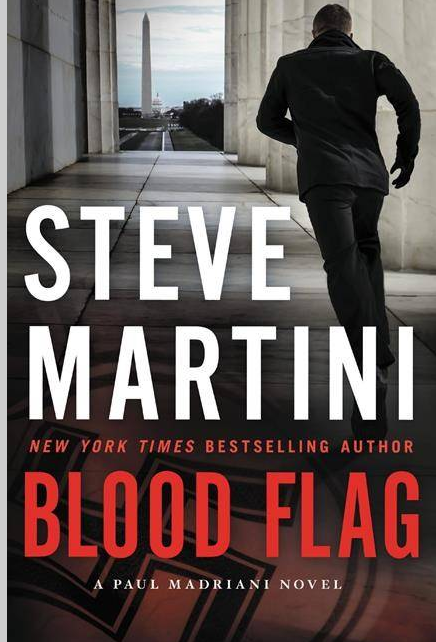 Blood Flag by Steve Martini
Blood Flag by Steve Martini
Not too long ago, I read Compelling Evidence, the first of 14 novels written by Steve Maritini ,which features private detective, Paul Madriani. This book was published in 1992 and I found it a terrific read and enjoyed the courtroom insight and intrigue. So now, I jumped to his latest novel in this series titled, Blood Flag. Perhaps my expectations were too high as I eagerly looked to see how the author had elevated his game after a quarter of a century.
Paul Madriani, the lawyer, was there with Harry, his trusted partner. There also was his special private investigator, Herman, who has a team of his “guys” to dig up information to further the plot. I thought these guys were overused to provide information for the story line.
The story begins as Madriani takes on a new client, an old woman who is accused of killing her hospitalized husband with an insulin injection in a mercy-type killing, which she denies. The deceased husband is connected with his World War II buddies who were in Berlin at the end of the war when Hitler committed suicide. They become linked to “Blutfahne” also known as the bloody flag, which is purported to have been designed by Adolf Hitler. (Remember, he was a struggling artist before the war). This flag was believed to have been first flown in Munich at the Beer Hall Putsch in 1923 where Hitler was arrested and put in jail (where he wrote Mein Kampf). There are supposed to be various keys to a safe deposit box where this symbolic, historical, iconic object is said to have been hidden.
Rather than being an exciting courtroom drama, which characterized his first novel in this series, this latest one in the series seems to me to have turned into a convoluted detective story. I didn’t believe that the characters were that well developed so I didn’t really care about most of them. Certainly, the author still has his touch in writing a dramatic moment or a confrontation, which occurred near the end of the book. I may have to give the author another chance by reading one of his earlier novels but I can’t recommend this latest one.
To obtain a copy of this book from Amazon, click here
Comment » | FM - Fiction Mystery
November 14th, 2010 — 2:13am
Buy now on Amazon: City of Thieves (Also available on Kindle!)
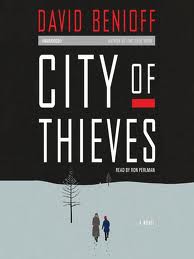 I read 90% of this book in one sitting on an airplane flying back to Los Angeles from China. So I obviously found it engrossing and it held my interest. Therefore I appreciate that it was recommended and made my flight easier. Having said that I do feel that if I am reading another heart wrenching story with painful graphic details of how innocent men women and children died as result of the Nazi’s during World War II, I would like it to have some new enlightening aspects of this history which will shed some fresh ideas on this atrocity, which I didn’t really find in this book Granted we did lean about horrible deaths often due to starvation and freezing temperatures as well as grisly murders for human food all due to the siege of Leningrad, in addition to the direct murder by the Nazis. While it is conceivable that some of the fanciful details how death was missed and survival occurred, may very well have happened to some people, our main characters seem to mostly have a string of good luck embodying an unusual amount of fortunate events. Perhaps the author was trying to have his cast represent many of the unusual, unbelievable and yet heroic things that the people of this beleaguered city had done. There also was a recurrent theme which seemed to be playing off the words and writings of various Russian writers, which might have been more interesting and coherent if I were familiar with these authors, which I am not. I did get the point that Koyla, the Russian deserter was whistling a happy tune because he was afraid himself and that his quoting the so called novel that his young friend never read, was actually from the novel which he hoped to write himself. However, all these references to Russian authors must have had some additional significance. Finally the author did something that I did not like. When Vika, the sharp shooting partisan decides to go her own way and depart from the the other two main characters, the narrator who is the young boy smitten with her ( who is supposed to be the authors grandfather telling him the story of his youth states, I knew I would never see her again. This is the author writing off this character which he basically restates in the next paragraph when he writes …and if the mystics are right and we are doomed to repeat our squalid lives ad infinitum, at least I will always return to that kiss. The character did not say I believed she was gone, he said I knew I would never see her again. Therefore when she reappears for the happy ending I was not only very surprised but I felt tricked with an unacceptable literary device. So in conclusion, while the book held my interest and will probably make a great movie, however for all of the above reasons, I give it thumbs down.
I read 90% of this book in one sitting on an airplane flying back to Los Angeles from China. So I obviously found it engrossing and it held my interest. Therefore I appreciate that it was recommended and made my flight easier. Having said that I do feel that if I am reading another heart wrenching story with painful graphic details of how innocent men women and children died as result of the Nazi’s during World War II, I would like it to have some new enlightening aspects of this history which will shed some fresh ideas on this atrocity, which I didn’t really find in this book Granted we did lean about horrible deaths often due to starvation and freezing temperatures as well as grisly murders for human food all due to the siege of Leningrad, in addition to the direct murder by the Nazis. While it is conceivable that some of the fanciful details how death was missed and survival occurred, may very well have happened to some people, our main characters seem to mostly have a string of good luck embodying an unusual amount of fortunate events. Perhaps the author was trying to have his cast represent many of the unusual, unbelievable and yet heroic things that the people of this beleaguered city had done. There also was a recurrent theme which seemed to be playing off the words and writings of various Russian writers, which might have been more interesting and coherent if I were familiar with these authors, which I am not. I did get the point that Koyla, the Russian deserter was whistling a happy tune because he was afraid himself and that his quoting the so called novel that his young friend never read, was actually from the novel which he hoped to write himself. However, all these references to Russian authors must have had some additional significance. Finally the author did something that I did not like. When Vika, the sharp shooting partisan decides to go her own way and depart from the the other two main characters, the narrator who is the young boy smitten with her ( who is supposed to be the authors grandfather telling him the story of his youth states, I knew I would never see her again. This is the author writing off this character which he basically restates in the next paragraph when he writes …and if the mystics are right and we are doomed to repeat our squalid lives ad infinitum, at least I will always return to that kiss. The character did not say I believed she was gone, he said I knew I would never see her again. Therefore when she reappears for the happy ending I was not only very surprised but I felt tricked with an unacceptable literary device. So in conclusion, while the book held my interest and will probably make a great movie, however for all of the above reasons, I give it thumbs down.
Comment » | FH - Fiction Historical
September 4th, 2009 — 5:50am
The Book Thief by Markus Zusak
by Markus Zusak
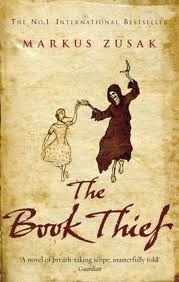 My initial experience with the book was somewhat negative. First, finding the book in the teen department of Barnes & Noble seemed somewhat curious. I had difficulty getting in to the book as the style and narrative seemed unusual and in retrospect perhaps uncomfortable as it seemed to be written from the point of view of an angel of death. Perhaps after about 50 pages I was comfortable with the book and was being drawn in to it although I could still easily put it down.
My initial experience with the book was somewhat negative. First, finding the book in the teen department of Barnes & Noble seemed somewhat curious. I had difficulty getting in to the book as the style and narrative seemed unusual and in retrospect perhaps uncomfortable as it seemed to be written from the point of view of an angel of death. Perhaps after about 50 pages I was comfortable with the book and was being drawn in to it although I could still easily put it down.
I also felt an early identification of Liesel with my seven year old granddaughter who has recently fell in love with words and books. This connection began to give me an added emotional attachment to the characters and the story which I usually have anyway to a holocaust book. I felt the author was making a meaningful insight to me as he spoke about Kristolnacht and clearly conveyed how the Nazis were bent on destroying words and the ideas behind them perhaps just as much as they were displacing their frustrations and hate on the Jews. As the book progressed – it became a page turner for me. The author used an interesting style of foreshadowing the events coming in each chapter which toyed with my anxiety and concern about the characters but yet I couldn’t be sure what was going to happen. I began to realize that I was developing great empathy and caring for the characters who were German non-Jews. I desperately wanted the characters who went off to fight the allies to survive. When the Jews were marched through the streets on their way Dachau Concentration Camp – I was accepting the idea that most of the observers were neutral and of course the main characters were heroic in wanting to give them bread.
By the conclusion of the story I of course was fully on board with the idea that all war is terrible and I felt very badly that most of the characters had been killed. I was touched that Liesel and Max had survived and were together. But what did they do with their life and did they feel guilty about what had been done to the Jews? The author who obviously was not Jewish said that he wrote the story based on memories of stories that his parents have told him from Austria and Germany and he wanted to show that not all Germans were bad. I found this quote from him on the Internet:
One day, there was a terrible noise coming from the main street of town, and when she( his mother) ran to see it, she saw that Jewish people were being marched to Dachau, the concentration camp. At the back of the line, there was an old man, totally emaciated, who couldn’t keep up. When a teenage boy saw this, he ran inside and brought the man a piece of bread. The man fell to his knees and kissed the boy’s ankles and thanked him…Soon, a soldier noticed and walked over. He tore the bread from the man’s hands and whipped him for taking it. Then he chased the boy and whipped him for giving him the bread in the first place. In one moment, there was great kindness and great cruelty, and I saw it as the perfect story of how humans are.
Therefore I reflect that at best this 30 year old author is an apologist for the Germans of the Nazi era and at worst has little appreciation for what really happened in the holocaust. Therefore I find myself negatively inclined toward him and what he had to say. He is a talented writer and wrote a great book . I am glad I read it but I wouldn’t recommend it to everyone and I am not sure to whom I would urge that they should read it. I recognize that this is a very personal reaction but it is the way I find myself feeling at this time.
Comment » | FH - Fiction Historical
 When I came across this outstanding book about the Holocaust, I was immediately reminded of all the excellent and meaningful books I have read about this subject. The first one probably being The Diary of Anne Frank and then so many other such interesting reads such as The Thief, The Nightingale, All the Light We Cannot See, Schindler’s List, as well as many others including many that I have not yet read.
When I came across this outstanding book about the Holocaust, I was immediately reminded of all the excellent and meaningful books I have read about this subject. The first one probably being The Diary of Anne Frank and then so many other such interesting reads such as The Thief, The Nightingale, All the Light We Cannot See, Schindler’s List, as well as many others including many that I have not yet read.
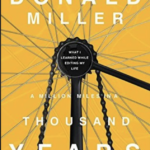


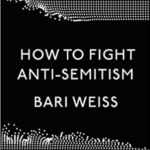

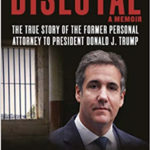
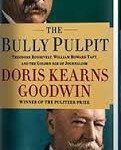

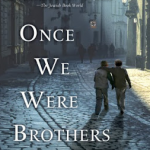
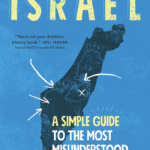




 Blood Flag by Steve Martini
Blood Flag by Steve Martini I read 90% of this book in one sitting on an airplane flying back to Los Angeles from China. So I obviously found it engrossing and it held my interest. Therefore I appreciate that it was recommended and made my flight easier. Having said that I do feel that if I am reading another heart wrenching story with painful graphic details of how innocent men women and children died as result of the Nazi’s during World War II, I would like it to have some new enlightening aspects of this history which will shed some fresh ideas on this atrocity, which I didn’t really find in this book Granted we did lean about horrible deaths often due to starvation and freezing temperatures as well as grisly murders for human food all due to the siege of Leningrad, in addition to the direct murder by the Nazis. While it is conceivable that some of the fanciful details how death was missed and survival occurred, may very well have happened to some people, our main characters seem to mostly have a string of good luck embodying an unusual amount of fortunate events. Perhaps the author was trying to have his cast represent many of the unusual, unbelievable and yet heroic things that the people of this beleaguered city had done. There also was a recurrent theme which seemed to be playing off the words and writings of various Russian writers, which might have been more interesting and coherent if I were familiar with these authors, which I am not. I did get the point that Koyla, the Russian deserter was whistling a happy tune because he was afraid himself and that his quoting the so called novel that his young friend never read, was actually from the novel which he hoped to write himself. However, all these references to Russian authors must have had some additional significance. Finally the author did something that I did not like. When Vika, the sharp shooting partisan decides to go her own way and depart from the the other two main characters, the narrator who is the young boy smitten with her ( who is supposed to be the authors grandfather telling him the story of his youth states, I knew I would never see her again. This is the author writing off this character which he basically restates in the next paragraph when he writes …and if the mystics are right and we are doomed to repeat our squalid lives ad infinitum, at least I will always return to that kiss. The character did not say I believed she was gone, he said I knew I would never see her again. Therefore when she reappears for the happy ending I was not only very surprised but I felt tricked with an unacceptable literary device. So in conclusion, while the book held my interest and will probably make a great movie, however for all of the above reasons, I give it thumbs down.
I read 90% of this book in one sitting on an airplane flying back to Los Angeles from China. So I obviously found it engrossing and it held my interest. Therefore I appreciate that it was recommended and made my flight easier. Having said that I do feel that if I am reading another heart wrenching story with painful graphic details of how innocent men women and children died as result of the Nazi’s during World War II, I would like it to have some new enlightening aspects of this history which will shed some fresh ideas on this atrocity, which I didn’t really find in this book Granted we did lean about horrible deaths often due to starvation and freezing temperatures as well as grisly murders for human food all due to the siege of Leningrad, in addition to the direct murder by the Nazis. While it is conceivable that some of the fanciful details how death was missed and survival occurred, may very well have happened to some people, our main characters seem to mostly have a string of good luck embodying an unusual amount of fortunate events. Perhaps the author was trying to have his cast represent many of the unusual, unbelievable and yet heroic things that the people of this beleaguered city had done. There also was a recurrent theme which seemed to be playing off the words and writings of various Russian writers, which might have been more interesting and coherent if I were familiar with these authors, which I am not. I did get the point that Koyla, the Russian deserter was whistling a happy tune because he was afraid himself and that his quoting the so called novel that his young friend never read, was actually from the novel which he hoped to write himself. However, all these references to Russian authors must have had some additional significance. Finally the author did something that I did not like. When Vika, the sharp shooting partisan decides to go her own way and depart from the the other two main characters, the narrator who is the young boy smitten with her ( who is supposed to be the authors grandfather telling him the story of his youth states, I knew I would never see her again. This is the author writing off this character which he basically restates in the next paragraph when he writes …and if the mystics are right and we are doomed to repeat our squalid lives ad infinitum, at least I will always return to that kiss. The character did not say I believed she was gone, he said I knew I would never see her again. Therefore when she reappears for the happy ending I was not only very surprised but I felt tricked with an unacceptable literary device. So in conclusion, while the book held my interest and will probably make a great movie, however for all of the above reasons, I give it thumbs down. My initial experience with the book was somewhat negative. First, finding the book in the teen department of Barnes & Noble seemed somewhat curious. I had difficulty getting in to the book as the style and narrative seemed unusual and in retrospect perhaps uncomfortable as it seemed to be written from the point of view of an angel of death. Perhaps after about 50 pages I was comfortable with the book and was being drawn in to it although I could still easily put it down.
My initial experience with the book was somewhat negative. First, finding the book in the teen department of Barnes & Noble seemed somewhat curious. I had difficulty getting in to the book as the style and narrative seemed unusual and in retrospect perhaps uncomfortable as it seemed to be written from the point of view of an angel of death. Perhaps after about 50 pages I was comfortable with the book and was being drawn in to it although I could still easily put it down.